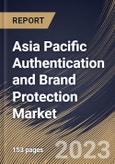The need to protect brand reputation, guarantee consumer safety, uphold legal compliance, protect intellectual property rights, and combat the growing problem of product piracy and counterfeiting in a variety of industries, are some of the key factors propelling the growth of the market regionally. In order to guarantee drug safety, efficacy, and quality, medicines are also subject to strict regulations. A company's dedication to patient safety and regulatory compliance can be seen in brand protection strategies that assist it in meeting regulatory standards.
Brands can use blockchain to confirm a product's validity, track its origin, and uphold supply chain transparency. The presence of cutting-edge technologies and solutions can aid brand protection initiatives. Urban regions, for instance, may benefit from stronger infrastructure for deploying track-and-trace systems, digital authentication tools, and data analytics tools for identifying and reducing brand misuse concerns.
The region has a proliferation e-commerce sector. For example, according to the ITA, the gross merchandise volume of the Singaporean eCommerce sector was US$7.1 billion in 2021, projected to increase to US$9.8 billion by 2025. Consumer electronics, fashion, food, cosmetics, personal care products, furniture, appliances, and toys are significant product categories in eCommerce. Similarly, according to Invest India estimates, the Gross Merchandise Value of the Indian e-commerce business exceeded $55 billion in 2021. It is anticipated to reach a $350 billion gross sales value annually by 2030. Hence, the increasing industries and businesses in this region that demand brand protection solutions will promote the growth of the regional market in the coming years.
The China market dominated the Asia Pacific Authentication and Brand Protection Market by Country in 2022, and would continue to be a dominant market till 2030; thereby, achieving a market value of $395.9 million by 2030. The Japan market is registering a CAGR of 8.1% during (2023-2030). Additionally, The India market would showcase a CAGR of 9.4% during (2023-2030).
Based on Offering, the market is segmented into Barcodes & QR Codes, Security Labels & Inks, RFID/NFC, Holograms and Authentication Chips. Based on Application, the market is segmented into Pharmaceuticals, Food & Beverages, Electronics, Automobile, Apparel, Luxury Goods, Cosmetics and Others. Based on Technology, the market is segmented into Overt, Covert, Digital and Forensic. Based on Authentication Mode, the market is segmented into Blockchain and Smartphone. Based on countries, the market is segmented into China, Japan, India, South Korea, Singapore, Malaysia, and Rest of Asia Pacific.
The market research report covers the analysis of key stake holders of the market. Key companies profiled in the report include Authentix Inc., Avery Dennison Corporatio, Brady Corporation, De La Reu plc, WISeKey International Holding Ltd, Infineon Technologies AG, Merck KGaA, Assa Abloy AB, Centro Grafico DG and Optel Group.
Scope of the Study
By Offering
- Barcodes & QR Codes
- Security Labels & Inks
- RFID/NFC
- Holograms
- Authentication Chips
By Application
- Pharmaceuticals
- Food & Beverages
- Electronics
- Automobile
- Apparel
- Luxury Goods
- Cosmetics
- Others
By Technology
- Overt
- Covert
- Digital
- Forensic
By Authentication Mode
- Blockchain
- Smartphone
By Country
- China
- Japan
- India
- South Korea
- Singapore
- Malaysia
- Rest of Asia Pacific
Key Market Players
List of Companies Profiled in the Report:
- Authentix Inc.
- Avery Dennison Corporation
- Brady Corporation
- De La Reu plc
- WISeKey International Holding Ltd
- Infineon Technologies AG
- Merck KGaA
- Assa Abloy AB
- Centro Grafico DG
- Optel Group
Unique Offerings
- Exhaustive coverage
- The highest number of Market tables and figures
- Subscription-based model available
- Guaranteed best price
- Assured post sales research support with 10% customization free
Table of Contents
Companies Mentioned
- Authentix Inc.
- Avery Dennison Corporation
- Brady Corporation
- De La Reu plc
- WISeKey International Holding Ltd
- Infineon Technologies AG
- Merck KGaA
- Assa Abloy AB
- Centro Grafico DG
- Optel Group








